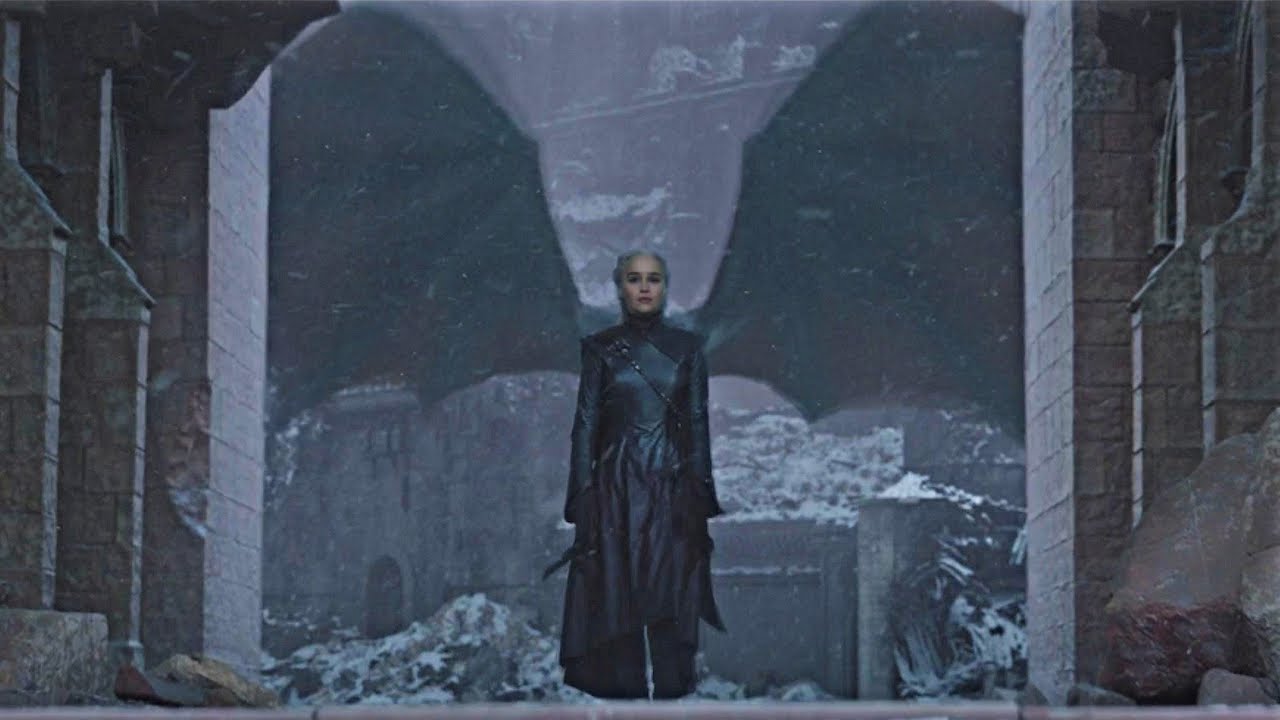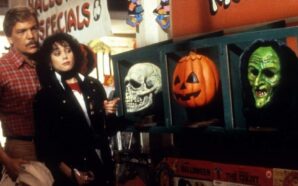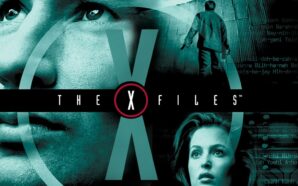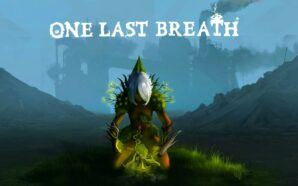For the past six weeks, I’ve been revisiting each episode of Game of Thrones’ final season exactly a year after they first aired. Today it all comes to an end as I review the contentious series finale ‘The Iron Throne’.
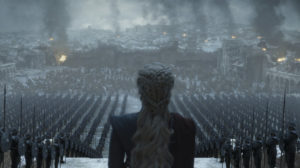 When I began rewatching this season I was shocked at just how unremarkable the premiere was. For such a controversial season of television you’d think the first episode would create some strong opinions of either extreme, and while such things came to pass in the following episodes, the premiere didn’t illicit such a response. It was… fine. So, imagine my surprise when I sat down to watch the series finale of Game of Thrones, for the first time since its initial airing, and found myself having a similar reaction as I did to the first episode of the final season. Away from the palpable anger and endless arguments you’ll still find on the Internet, the finale is surprisingly reserved and perfunctory. I don’t say this completely as a positive but nor do I as a negative either. ‘The Iron Throne’ is, quite astoundingly, an adequate but dull finale undeserving of both the extreme hatred and praise heaped on it by warring factions of the fandom.
When I began rewatching this season I was shocked at just how unremarkable the premiere was. For such a controversial season of television you’d think the first episode would create some strong opinions of either extreme, and while such things came to pass in the following episodes, the premiere didn’t illicit such a response. It was… fine. So, imagine my surprise when I sat down to watch the series finale of Game of Thrones, for the first time since its initial airing, and found myself having a similar reaction as I did to the first episode of the final season. Away from the palpable anger and endless arguments you’ll still find on the Internet, the finale is surprisingly reserved and perfunctory. I don’t say this completely as a positive but nor do I as a negative either. ‘The Iron Throne’ is, quite astoundingly, an adequate but dull finale undeserving of both the extreme hatred and praise heaped on it by warring factions of the fandom.
The episode picks up immediately after Daenerys’ decimation of King’s Landing as Tyrion walks from the destroyed city gate all the way to the Red Keep, where the old queen lays fallen and the new queen stands triumphant. It’s a very effective sequence that once again highlights the horrors that have transpired within the city. While last episode graphically presented King’s Landing burning, along with its denizens, in epic sequences of destruction and mayhem, the finale instead quietly shows us the lasting impact. There’s very little dialogue in the opening minutes, as Tyrion passes charred corpses while ash covers the city’s streets; the true enemy of the common folk was never ice but rather the fire rising to meet it.
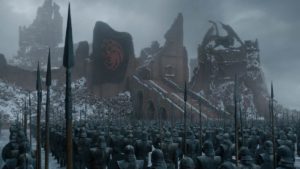 Many of the lead characters make their way through the dead city to witness Dany’s forces amassing below the Red Keep; the Unsullied silently in formation and the Dothraki ululating atop unsettled horses. Daenerys arrives to give a speech and the first shot of her in the episode is a thing of beauty, with Drogon’s wings visible behind her making it seem as though they are sprouting from her body after her dominant display of Targaryen fire and blood in the previous episode. She has been transformed from that young woman we once knew into a monster, hellbent on seizing the throne that gives the episode its name. She delivers a thunderous speech brimming with hypocrisy, stating that she has freed King’s Landing from a tyrant and now seeks to do the same to the entire Seven Kingdoms under her control. She feels no sympathy or regret, and now that she’s crossed the line we only view her from the perspective of other characters as they plot to save Westeros from the Dragon Queen.
Many of the lead characters make their way through the dead city to witness Dany’s forces amassing below the Red Keep; the Unsullied silently in formation and the Dothraki ululating atop unsettled horses. Daenerys arrives to give a speech and the first shot of her in the episode is a thing of beauty, with Drogon’s wings visible behind her making it seem as though they are sprouting from her body after her dominant display of Targaryen fire and blood in the previous episode. She has been transformed from that young woman we once knew into a monster, hellbent on seizing the throne that gives the episode its name. She delivers a thunderous speech brimming with hypocrisy, stating that she has freed King’s Landing from a tyrant and now seeks to do the same to the entire Seven Kingdoms under her control. She feels no sympathy or regret, and now that she’s crossed the line we only view her from the perspective of other characters as they plot to save Westeros from the Dragon Queen.
After seasons of drifting off into the background, Tyrion is granted the starring role of the finale and his actions deliver the ultimate fate of Westeros, as he persuades Jon to kill Daenerys and plots to make Bran king, both from inside a prison cell. The conversation with Jon about what action he must take certainly drags on for far too long and Jon initially trying to stand up for Daenerys’ actions feels odd. After what he’s witnessed, he would take issue with them immediately. Jon’s choice to either kill Dany or kneel before her all hinges on their relationship, which frustratingly is underdeveloped. Do we buy Jon’s love for her? Has their romance ever worked after its rushed beginnings just ten episodes ago? We accept it because the romance is clearly the direction the plot needed to go, but this decision would be so much more powerful if their relationship felt real. The finale is only as good as its foundations.
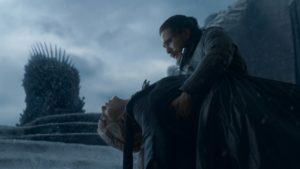 Jon is the shield that guards the gates of men, but instead of ice it’s fire he’s destined to destroy. This twisting of fates is my favourite element of the final season. Characters we thought would find narrative closure in the war against the Night King instead find it in the war to take the throne, and vice versa, with Arya being the counterpoint to Jon is this regard. As Daenerys reaches the Iron Throne, just like her vision in the second season, she touches the seat of power but never gets the chance to sit upon it before Jon appears. She wants to reminisce about stories of the throne her brother once told her but Jon breaks her from her reverie immediately and gets straight to the point. She reaches out to him for the third time in three episodes and once more he denies her that comfort, this time with deathly finality. In many ways the scene mirrors their first meeting at Dragonstone apart from in one crucial aspect: it all happens far too quickly. Before you know it, they’re hugging and a knife is buried in Dany’s heart.
Jon is the shield that guards the gates of men, but instead of ice it’s fire he’s destined to destroy. This twisting of fates is my favourite element of the final season. Characters we thought would find narrative closure in the war against the Night King instead find it in the war to take the throne, and vice versa, with Arya being the counterpoint to Jon is this regard. As Daenerys reaches the Iron Throne, just like her vision in the second season, she touches the seat of power but never gets the chance to sit upon it before Jon appears. She wants to reminisce about stories of the throne her brother once told her but Jon breaks her from her reverie immediately and gets straight to the point. She reaches out to him for the third time in three episodes and once more he denies her that comfort, this time with deathly finality. In many ways the scene mirrors their first meeting at Dragonstone apart from in one crucial aspect: it all happens far too quickly. Before you know it, they’re hugging and a knife is buried in Dany’s heart.
Drogon appears to find his mother dead at Jon’s feet but instead of burning the last living Targaryen, the dragon turns towards the Iron Throne – the quest for which has created so much misery and caused so many deaths – and melts it down into a puddle of molten metal and slag. Does Drogon understand his actions? Does he smelt the throne in rage or does the dragon understand the symbolism of such an action? I really enjoy this question, especially after Dany finally took the advice of Olenna Tyrell and Missandei last episode to “be a dragon”. This phrase was said, and enacted upon, with it meaning to use fury and that innate Targaryen rage to take what you want. The phraseology implies that a dragon is a weapon, a tool, used to devastate, just like we witnessed in ‘The Bells’. So, I love that the finale presents a dragon, depending on your interpretation, as surprisingly sentient and able to see the folly of human desire, rather than just be used as a weapon to help pursue it.
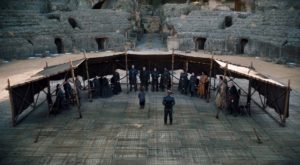 And so ends the first part of the series finale. ‘The Iron Throne’ really does feel like two distinct episodes, both halves being pretty much exactly the same length. The first dealt with stopping the dangerous path Westeros was heading down with fire and blood and the second is about deciding which path to take next. While the first half had sufficient time to execute its narrative aims, the second doesn’t. We’re left with 40 minutes to decide the fate of the Seven Kingdoms and wrap up all the remaining character stories. It’s rushed and yet surprisingly dull at the same time. I like most of the storytelling decisions but upon rewatch I was shocked at how little it held my attention.
And so ends the first part of the series finale. ‘The Iron Throne’ really does feel like two distinct episodes, both halves being pretty much exactly the same length. The first dealt with stopping the dangerous path Westeros was heading down with fire and blood and the second is about deciding which path to take next. While the first half had sufficient time to execute its narrative aims, the second doesn’t. We’re left with 40 minutes to decide the fate of the Seven Kingdoms and wrap up all the remaining character stories. It’s rushed and yet surprisingly dull at the same time. I like most of the storytelling decisions but upon rewatch I was shocked at how little it held my attention.
We pick up the story a few weeks later and in that time Jon has told the truth about what happened to Daenerys and is imprisoned, King’s Landing is seemingly back to normal (which is such a disappointment), and pretty much every surviving character is gathered in the Dragonpit to face Tyrion and decide the next ruler of the Seven Kingdoms. The scene at the Dragonpit is maybe the most pivotal and important scene of the entire series and I so I wish we spent more time there, so every point made could be fully explored. I’m only half joking when I say I’d take an 80-minute episode composed of just that scene. After being distracted by the random Dornish prince at the meeting, Edmure Tully nominates himself for the crown only be told to sit down and shut up. It’s a moment played for laughs and, in what should be a tightly and impeccably crafted scene, it feels tonally wrong. As does Sam’s suggestion of a democracy being laughed at. I like the idea of the populace having a vote being dismissed by the lords and ladies of Westeros as too radical a concept but playing it for comedy doesn’t work. And what is Sam doing at the meeting to decide Westeros’ fate anyway?
 Tyrion nominates Bran to be the next ruler and after all but three minutes of explaining the choice, the majority agrees. On my first watch, a year ago, I thought this was a completely bizarre decision and, while it still is, I now think it’s quite brilliant, just poorly executed in some regards. Following Daenerys’ mantra, Tyrion has found a novel way to “break the wheel”. Bran represents not one but two cliché yet correct musings about power and the future. The person best fit to rule is the one that doesn’t want the crown and Bran is the person who can best learn from history to not make the same mistakes in the future. The issue is that Bran as a character is so dull. This all works symbolically but not so much practically. Bran is no longer a character but a plot device and symbol for something. I wish he could be both. His coronation is like putting the medieval fantasy version of a predictive artificial intelligence in charge of humanity. However, I do really like the idea that kings will now be chosen rather than born after Bran’s reign. I wonder if Bran will pass down his Three-Eyed Raven powers to the next elected ruler?
Tyrion nominates Bran to be the next ruler and after all but three minutes of explaining the choice, the majority agrees. On my first watch, a year ago, I thought this was a completely bizarre decision and, while it still is, I now think it’s quite brilliant, just poorly executed in some regards. Following Daenerys’ mantra, Tyrion has found a novel way to “break the wheel”. Bran represents not one but two cliché yet correct musings about power and the future. The person best fit to rule is the one that doesn’t want the crown and Bran is the person who can best learn from history to not make the same mistakes in the future. The issue is that Bran as a character is so dull. This all works symbolically but not so much practically. Bran is no longer a character but a plot device and symbol for something. I wish he could be both. His coronation is like putting the medieval fantasy version of a predictive artificial intelligence in charge of humanity. However, I do really like the idea that kings will now be chosen rather than born after Bran’s reign. I wonder if Bran will pass down his Three-Eyed Raven powers to the next elected ruler?
Thematically, the episode is dominated by this battle between the past and the future; a fitting theme to have for the final episode of such a huge series leaving behind a detailed history and an unknown future. With Bran there is a hope that this world will learn from its mistakes and not make the same ones again, like Daenerys fulfilling her father’s legacy. The wheel is not so much broken as simply facing a new direction. ‘The Iron Throne’ also compares Jon and Daenerys, who are two sides of the same Targaryen coin that by the end of the episode is no longer currency, in terms of whether they are defined by their heritage and past deeds.
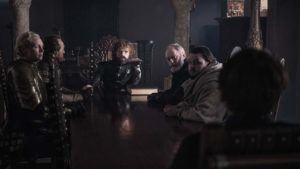 The episode is also, in a rather meta way, about stories. Bran and those characters who help him rule will not only learn from some nebulous backstory but also from what they’ve personally gone through over the course of the series, a collection of events now part of history itself. Sam, who is given the role of Grand Maester before the credits roll, presents an apocryphal chronicle of the events of the show itself, cutely named after the real-life book series, ‘A Song of Ice and Fire’. And when asked if Tyrion made the right decision in crowning Bran, he says to ask him again in ten years’ time, which is no doubt how the writers feel about the finale themselves.
The episode is also, in a rather meta way, about stories. Bran and those characters who help him rule will not only learn from some nebulous backstory but also from what they’ve personally gone through over the course of the series, a collection of events now part of history itself. Sam, who is given the role of Grand Maester before the credits roll, presents an apocryphal chronicle of the events of the show itself, cutely named after the real-life book series, ‘A Song of Ice and Fire’. And when asked if Tyrion made the right decision in crowning Bran, he says to ask him again in ten years’ time, which is no doubt how the writers feel about the finale themselves.
Bran’s reign ushers in a new era for the Seven Kingdoms – so much so that they’re now the Six Kingdoms – and the few characters still alive after the ash has settled find themselves in new situations:
- For the final few seasons of the show, I’ve been Team Sansa and so was slightly disappointed to not see her on the Iron Throne at the end. But considering that there’s not an Iron Throne anymore, I’ve always suspected that Bran was chosen as king because he’s in a wheelchair and they don’t need to spend the money on building a new throne. If Sansa can’t have the Seven Kingdoms then ruling the North as an independent kingdom is the next best thing. She’s had a wonderful arc over the eight seasons and it’s great to see her realise her dream from season one of being a queen, although now of her own volition and not through marriage.
- Tyrion is named Hand of the King for the same reason Bran is named King – because he doesn’t want it. He’s given the opportunity to fix his mistakes and I think this is a good ending for him.
- Grey Worm takes the medal for the character I was sure would die but against all odds survives. The last time we see him he’s leaving for Naath with his fellow Unsullied, but I just don’t buy that he would drop his revenge against Jon without any confrontation. He would kill him the second he learnt that Jon killed Dany, not imprison him and ultimately free him.
- After regaining some humanity and no longer being a slave to revenge or Westerosi politics, Arya chooses to seek the answer to the question of “what’s west of Westeros?” She takes a ship and crew to travel the world, setting up the best spin-off we’ll never see. As I’ve previously stated, I think Arya is probably the best served character by this final season.
- What’s there to say about Bronn? He manipulated his way onto the new small council with one short scene a couple of episodes ago and a promise is a promise, I guess. It’s unbelievable that Bran would allow this cutthroat to help usher in a new, better future.
- Davos is made ‘Master of Ships’, and unofficially the ‘Master of Grammar’ too. Not bad for a former criminal smuggler who couldn’t read or write at the start of the series. It’s a decent endpoint for him, I just wish he had more to do over the last couple of seasons.
- It’s implied that Brienne becomes Lord Commander of the Kingsguard, and Podrick one of her knights. I wish we got a scene exploring this and what it means to her after that fantastic scene earlier in the season where Jaime knights her. In response, she fills in Jaime’s history in the Kingsguard book, making the ending of his arc seem not like the crushing disappointment it actually was.
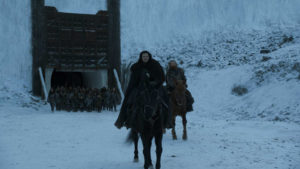 The episode, and the series, ends with Bran leading Westeros into a new era of hopefully peace and prosperity, backed by a small council of supporting characters who have undergone much change over these eight seasons. We’re offered a final montage of the Stark children as they begin a new chapter of their lives, including Jon who is sent to the Night’s Watch as punishment. But punishment isn’t the right word; he’s sent home. His true home at the Wall and what lies further north. He’s not a Targaryen but rather a Wildling, no longer needed in Westeros, and he leaves with Ghost and Tormund towards a quieter future. Like Aemon before him, he’s sent to the Wall and likely forgotten, even if there’s little need for a Night’s Watch now. As he journeys north of the Wall, in a scene mimicking the first of the entire series, a small green planet has burrowed itself out of the snow. A dream of spring has countered the winds of winter and it makes for a fitting finale to the fantasy series.
The episode, and the series, ends with Bran leading Westeros into a new era of hopefully peace and prosperity, backed by a small council of supporting characters who have undergone much change over these eight seasons. We’re offered a final montage of the Stark children as they begin a new chapter of their lives, including Jon who is sent to the Night’s Watch as punishment. But punishment isn’t the right word; he’s sent home. His true home at the Wall and what lies further north. He’s not a Targaryen but rather a Wildling, no longer needed in Westeros, and he leaves with Ghost and Tormund towards a quieter future. Like Aemon before him, he’s sent to the Wall and likely forgotten, even if there’s little need for a Night’s Watch now. As he journeys north of the Wall, in a scene mimicking the first of the entire series, a small green planet has burrowed itself out of the snow. A dream of spring has countered the winds of winter and it makes for a fitting finale to the fantasy series.
It’s not a perfect ending by any means. It has flaws, as does the season as a whole. But it’s here I want to comment on something that I’ve wanted to discuss from the very beginning of this review series. It’s okay to dislike the final season of Game of Thrones. It’s okay to hate it. But I really can’t stand the constant levels of anger and hate aimed towards the people involved in the creation and conclusion of the show. Some of the reactions shared across the Internet are just stupid and horrible, and that’s partly why I wanted to wait a year and revisit the show away from the ‘fans’ to finally come to terms with how I feel about the series. I disagree with some of the decisions made in the final six episodes but that doesn’t mean the writers didn’t know what they were doing, or didn’t care. Only that they did something different than you or I would have. The level of hate against the head writers Dan Weiss and David Benioff is stupid. No matter how much you dislike the final season – I really hate what happened with Jaime for example – personal attacks and the type of reactions you still see on Reddit and such places are immature and dumb. Get over it, and get over yourselves. Don’t worry, my annoying preaching is over now.
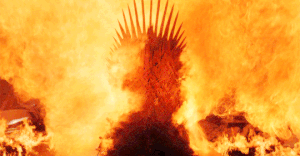 While I have issues with these final six episodes of the series, I’m content with the ending we received. It could have been much better and I stand by believing that most of the issues with the final two seasons spawn from the low episode count. I can see why the show would be structured like this for production reasons because of the sheer scale and scope of the show’s closing chapters, but the rush to close out the narrative in such a limited space of time led to most of the storytelling problems on display. Other than Jaime’s arc, the lack of consequences from the Night King’s invasion and a few small moments, I think the story that was told over these final six episodes was good. It was just often told in a disappointing way. The execution was off in certain respects and this final episode, fittingly leaving the fate of Westeros in the hands of cripples, bastards and broken men, is a bit bland and pedestrian. Overall, while it may sound boring to say about a TV series that has created so much discourse and controversy, the ending of Game of Thrones is… fine.
While I have issues with these final six episodes of the series, I’m content with the ending we received. It could have been much better and I stand by believing that most of the issues with the final two seasons spawn from the low episode count. I can see why the show would be structured like this for production reasons because of the sheer scale and scope of the show’s closing chapters, but the rush to close out the narrative in such a limited space of time led to most of the storytelling problems on display. Other than Jaime’s arc, the lack of consequences from the Night King’s invasion and a few small moments, I think the story that was told over these final six episodes was good. It was just often told in a disappointing way. The execution was off in certain respects and this final episode, fittingly leaving the fate of Westeros in the hands of cripples, bastards and broken men, is a bit bland and pedestrian. Overall, while it may sound boring to say about a TV series that has created so much discourse and controversy, the ending of Game of Thrones is… fine.
What are your thoughts on ‘The Iron Throne’? Do you think the once beloved series went out with a bang or a whimper? Let me know in the comments and be sure to geek out with me about TV, movies and video-games on Twitter @kylebrrtt.




